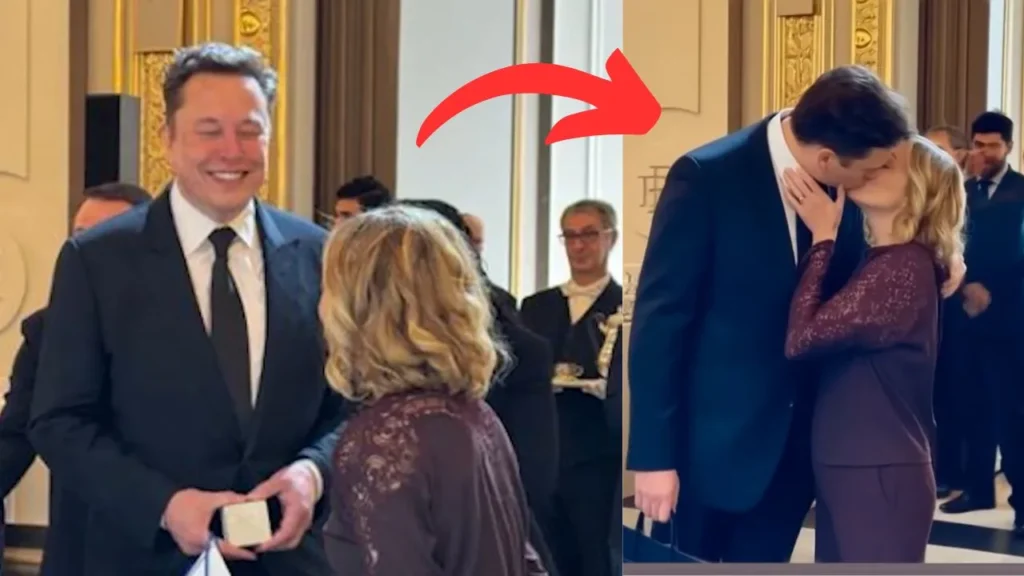
In an era dominated by digital advancements, the line between reality and fiction has become increasingly blurred. A recent viral video featuring Italian Prime Minister Giorgia Meloni and Tesla CEO Elon Musk exemplifies this phenomenon. The video, which purportedly shows the two leaders sharing a kiss, has ignited widespread attention online. However, the footage is not real; it is a deepfake an AI-generated fabrication that highlights the dangerous potential of modern technology to distort the truth. This incident underscores the pressing need to address the ethical implications of AI-generated content and its potential to disrupt society.
The Origins of the Viral Video
The meeting between Giorgia Meloni, Italy’s first female prime minister, and Elon Musk took place during the opening of the NRAAM Cathedral. Official footage shows the two leaders shaking hands, smiling, and engaging in conversation. These moments were widely shared on social media, sparking curiosity and speculation. However, the narrative took a sinister turn when a deepfake video emerged, depicting Meloni and Musk in a romantic encounter. The fabricated video quickly went viral, with captions like “È amore” (“It’s love”) fueling the controversy.
Spotting the Signs of a Deepfake
While convincing at first glance, closer examination reveals telltale signs of manipulation in the video. The hand movements are distorted, and certain angles reveal inconsistencies in the facial features, making it clear that the individuals do not truly resemble Meloni or Musk. Additionally, the background figures in the video appear distorted, another common hallmark of AI-generated content. Despite these visible discrepancies, the video’s spread highlights the ease with which such fabrications can deceive millions.
The Gendered Impact of AI Fabrications
For female leaders like Giorgia Meloni, deepfake videos pose unique challenges. As Italy’s first female prime minister, Meloni has already faced significant scrutiny and gender-based stereotyping. Her expressive demeanor and prominent role in global politics make her a frequent target of memes and online commentary. The deepfake video, however, represents a new level of attack—one that threatens not only her personal reputation but also her professional legitimacy.
Women in politics often navigate a landscape riddled with gendered biases. They must constantly prove their credibility in male-dominated spaces. Fabricated content like the “Musone” video risks trivializing their work, reducing their public image to tabloid fodder. Such incidents can perpetuate harmful stereotypes and undermine years of effort to establish authority and respect in their roles.
The Broader Political Consequences
The implications of deepfake videos extend far beyond personal reputations. They have the potential to disrupt diplomatic relations and destabilize governments. Giorgia Meloni and Elon Musk share a professional relationship, with Meloni recently emphasizing her ability to maintain friendly relations while asserting her independence. Fabrications like the viral video can sow unnecessary discord, casting doubt on serious diplomatic dialogues and creating unwarranted tension among international allies.
Imagine a scenario where AI-generated content falsely portrays a world leader making inflammatory remarks or engaging in inappropriate behavior. The resulting public and diplomatic fallout could be catastrophic, eroding trust in institutions and destabilizing global relations. Such content can be weaponized to sabotage political figures, influence elections, and manipulate public opinion on a massive scale.
The Ethical Dilemmas of AI Technology
The rise of AI-generated content presents a profound ethical challenge. While AI offers immense potential for innovation and progress, its misuse poses significant risks. The creation and dissemination of deepfake videos highlight the urgent need for safeguards to protect against the malicious use of this technology.
Governments, tech companies, and civil society must work together to develop and enforce regulations that address the ethical dilemmas posed by AI. This includes creating mechanisms to identify and flag deepfake content, educating the public about the signs of AI manipulation, and holding creators of malicious content accountable. Transparency and collaboration are essential to ensure that truth remains a cornerstone of our digital age.
A Call to Action
The viral deepfake video featuring Giorgia Meloni and Elon Musk serves as a chilling reminder of the power and peril of AI technology. As society grapples with the ethical implications of AI, it is imperative to prioritize the protection of truth and integrity in the digital sphere. Outrage sparked by incidents like this must not be fleeting; it should serve as a catalyst for meaningful change.
The fight against deepfake videos and other forms of AI-generated misinformation requires a collective effort. By raising awareness, implementing robust safeguards, and fostering ethical AI development, we can mitigate the dangers posed by this technology and safeguard the credibility of individuals and institutions alike. In doing so, we ensure that the digital age remains a force for progress rather than a tool for deception.